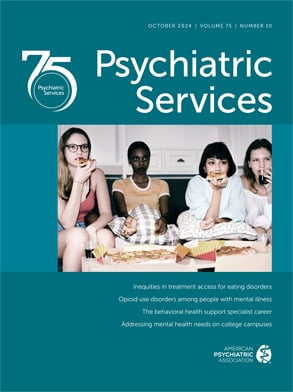Enhancing Adherence to Treatment for Bipolar Disorder
The economic burden of bipolar disorder, which affects nearly 2 percent of the U.S. population, is estimated to be $45 billion annually. A recent report found that one in three persons with the disorder fails to take at least 30 percent of prescribed medication. In this issue, a review by Martha Sajatovic, M.D., and her colleagues examines the limited literature on enhancing adherence to treatment among patients with bipolar disorder—a complex clinical challenge. Data from the 11 controlled trials reviewed in the article are promising and reflect a growing understanding of how best to manage this illness. Interventions that have been shown to be effective include interpersonal group therapy, cognitive-behavioral therapy, group sessions for partners of persons with bipolar illness, and patient and family psychoeducation. Effective therapies are patient focused and occur in the context of long-term management of illness that incorporates a good understanding of medications and their risks and benefits (see page 264).
Strategies for Reducing Medication Errors
In this month's Patient Safety Forum, a new quarterly feature designed to encourage attention to medical errors in psychiatry and edited by Benjamin Grasso, M.D., four expert discussants—from the Dana-Farber Cancer Institute, the Medicare Rights Center, Johns Hopkins Hospital, and the Institute of Medicine—address the question, What is a reasonable first-year strategic plan to better address medication errors in psychiatry? Their responses cover the importance of leadership's involvement at the board, clinical, and administrative levels; structural inadequacies of the Medicare system, which arguably hit psychiatric patients disproportionately hard and which will require alliances between the psychiatric profession and consumer advocate groups; four steps that one institution has taken during the first year of a strategic plan to reduce medication errors; and projects conducted by the Institute of Medicine in the area of health care quality, with an emphasis on systems improvement, data standards, and process improvements as ways of avoiding errors in psychiatry and in all branches of medicine (see page 259).
Integrated Care at Substance Abuse Centers
Given the high rate of co-occurrence of substance abuse and mental disorders, integrated service delivery is of vital concern for clients of substance abuse treatment centers. Hannah K. Knudsen, Ph.D., and her colleagues used survey data from the National Treatment Center Study to identify the proportion of private substance abuse treatment centers that offered psychiatric programs between 1995 and 2001. They found that about 59 percent of private centers offered a psychiatric program and that this proportion did not change significantly over the study period. The proportion of centers that referred clients with severe mental illness to external providers increased significantly over time, from 57 percent to 67 percent. For-profit and hospital-based centers were significantly more likely to offer psychiatric programs and less likely to refer severe cases to other providers. Thus it would appear that integrated care for clients with dual diagnosis is becoming less available (see page 270).
Surveys of New Yorkers After September 11, 2001
Telephone surveys conducted with large samples of New York City residents one to two months after the attack on the World Trade Center and four to five months after the attack indicate that increases in the use of mental health services and psychotropic drugs were modest and decreased over time. Joseph A. Boscarino, Ph.D., M.P.H., and his associates found that those who used services four to five months after the attack were depressed, had posttraumatic stress disorder, or reported experiencing four or more lifetime traumatic events or two or more stressful life events in the past year. Those who used medications were more likely to report life stresses in the past year, to have a primary care physician, and to be between the ages of 25 and 64. African Americans and Hispanics were significantly less likely than white respondents to have used services or medications after the attack (see page 274).
Briefly Noted…
• The Emergency Psychiatry column addresses the question of whether psychiatrists in emergency settings can predict which youths will turn violent and, if not, what can be done to ensure youth and public safety (see page 223).
• The Multimedia Reviews column examines the burgeoning popularity of weblogs, newsfeeds, and social software and how technological developments are changing the way we gather information (see page 247).
• A new information system at two Veterans Affairs medical centers is improving care for outpatients with schizophrenia (see page 253).

